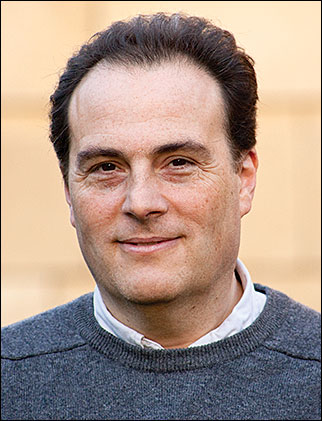Ben Simons

Prof Ben Simons
Herchel Smith Chair in Physics
Fellow of St John's College
Office: 539 Mott Bld
Phone: +44(0)1223 3 37253
Email: bds10 @ cam.ac.uk
Personal web site
TCM Group, Cavendish Laboratory
19 JJ Thomson Avenue,
Cambridge, CB3 0HE UK.

Research
The research interests of my group are divided between quantum condensed matter theory and the application of statistical methods to address collective phenomena in biological systems. In the area of condensed matter theory, the group has studied of quantum phase coherence effects in semiconducting media, Anderson localization phenomena, mesoscopic superconductivity, and condensation phenomena in driven matter-light systems. In the field of ultracold atom physics, we have interests in the phenomenon of resonance superfluidity, quantum quench dynamics, and atomic condensation phenomena in driven optical cavities. Finally, in the field of stem cell and developmental biology, we have established a collaborative programme of research exploiting genetic lineage tracing assays to study the mechanisms that regulate the balance between cell proliferation and differentiation in developing and cycling adult tissues, and the factors that promote dysregulation in ageing and the transition to diseased states.

In Plain English
In the search for new fundamental physical phenomena, the attention of the media is naturally drawn to the LHC or the Hubble space telescope. Yet the most unexpected and "exotic" physical phenomena are often grounded in the "terrestrial world". Since the formulation of electrodynamics and quantum mechanics nearly a century ago, our understanding of the fundamental interactions that characterize ions and electrons has been complete. Yet experience shows that the phase behaviour of statistical ensembles of such interacting particles may be very different from the properties of their isolated constituents. In condensed matter theory, we are interested in predicting new collective phase behaviours that can emerge through interaction effects. Our targets are diverse, ranging from the study of correlated metals, insulators, and ultracold atomic gases, to the biology of cellular and subcellular systems. Yet our tools of quantum and classical field theory expose the rich network of connections that unify seemingly diverse physical phenomena.
Featured Publications
- Strategies of stem cell self-renewal in adult tissues. Cell 145 851 - 862 (2014)
- Intestinal stem cell replacement follows a pattern of neutral drift. Science 330 822 - 825 (2014)
- Finite-temperature phase diagram of a polarised Fermi condensate. Nature Physics 3 124 - 128 (2014)
- Matrix models, one-dimensional fermions, and quantum chaos. Phys Rev Lett 72 64 (2014)